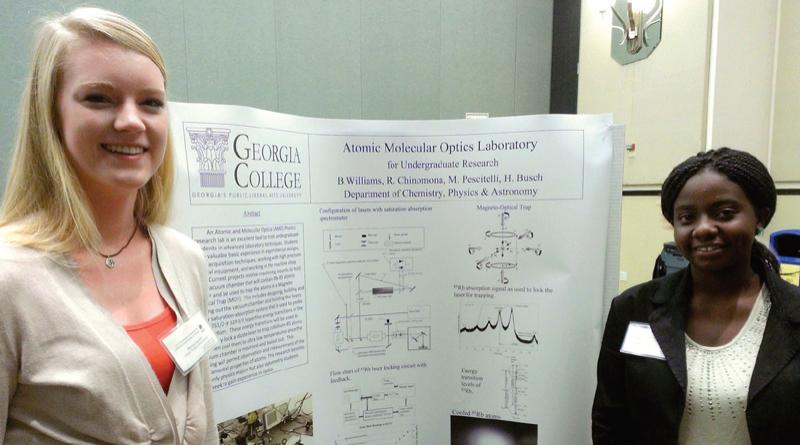Southeast Conference for Undergraduate Women in Physics, Jan.18–20, 2013, University of Central Florida
Conferences for Undergraduate Women in Physics
January 18, 2013 to January 20, 2013
University of Central Florida
By:Lily Udumukwu
SPS Chapter:

We all desire to be successful, so the best stories are those that celebrate success. At the Southeast Conference for Undergraduate Women in Physics (SCUWiP), where professionals from academia, industry, and government participated in a series of panel discussions, I was privy to a weekend-long banquet of telling testimonials. On the first full day, the conference commenced its schedule of events with stories of successful journeys and the obstacles encountered along the way from minorities and the minority’s minority: women of color in the fields of science, technology, engineering, and mathematics (STEM). Although not all women, the panelists had all experienced what it felt like to be underrepresented in STEM.
“I remember bubbling with nervous energy when the day came for university recruits to attend the grad fair,” said Peter Delfyett of the University of Central Florida. “Sweaty palms transferred my prized credentials to theirs, but all in all, I was well received.” Seated before a sea of undergraduates, Delfyett and the other panelists held no reservations as they divulged personal experiences from when they were budding minorities in their fields.
After graduating from the City College of New York (CCNY), Peter Delfyett pursued graduate studies for three years at one school before transferring back to CCNY to complete his PhD. He recalled the enthusiasm admissions personnel at that first school had displayed toward his prospective candidacy.
I remember how enthusiastic I was, gaining acceptance into this prestigious school, and at the time of my application, it seemed like they were happy too. But it was very different once I was there; there was a moment I remember walking down the hallways of my department after studying judiciously for a test, alone. I peered through a window and could see a bunch of guys in my class engaged in a group study meeting that I wasn’t invited to.
Marta McNeese of Spelman College extended those sentiments, mentioning that she is often mistaken for a custodial employee at national conferences and pestered with questions about the whereabouts of bathroom facilities. Far too often, we lose potential scientists, engineers, and pioneers in STEM fields because of biases operating at an unconscious level—petty, yet powerful predispositions.
“Throughout my studies it was like chipping away at an iceberg with a toothpick,” said Cecille Labuda of the University of Mississippi. “As women we are already the minority, but as a foreign native there was additional pressure to prove myself.” Born in the island nation of Dominica, Labuda reinforced the importance of perseverance, stating that if you want it bad enough, you’ll make it happen and everything else, obstacles mental or otherwise, will become background noise.
“It’s like Whistling Vivaldi,” she explained. In this book, which studies the negative effects of stereotypes, especially in education, an African American whistles classical music (composed by Vivaldi) to dispel any unease his counterparts anticipated in his presence.
This portion of the Southeastern Conference for Undergraduate Women in Physics illuminated the progress women have made in the historically male-dominated fields of science, technology, engineering, and mathematics. Undergraduates were also exposed to the discouraging bias often present in the collegiate environment and the lack of diversity among women in STEM fields.
The attendees were also, and more importantly, encouraged to succeed. Despite changing schools, Delfyett holds 34 US patents, has published over 600 articles in refereed journals, and is a recipient of the National Science Foundation Presidential Faculty Fellow Early Career Award for Scientists and Engineers, awarded to the nation’s top 20 scientists each year. McNeese earned her PhD at MIT and in 2000 made the decision to join the faculty at Spelman College, a historically black college. Her desire is to champion the field of physics as a viable career option for African American women. Labuda earned a bachelor’s, master’s, and PhD in physics, and as a professor at the University of Mississippi, her research interests are supported by the National Institutes of Health.
Whether it is by accomplishing one’s studies at a more fitting institution, purposefully ignoring biased profiling, or whistling a classical tune, the underrepresented must find a means to persevere and make gains. Stereotypes are perhaps an inherent challenge of living in a diverse society, and to combat them we must stake a claim to our interests. //
Become an SPS Reporter!
The Society of Physics Students (SPS) offers travel support at a level of $200 for SPS chapters or individual students reporting on a national physics meeting for SPS.
The resulting articles are 2-3 page reflections about the meeting from a student perspective, often used as feature articles on the SPS website and included in SPS publications such as The SPS Observer or Radiations, the magazine of Sigma Pi Sigma, the physics honor society. The articles may also be used in publications of the organization hosting the meeting.
Read the full articles by the SPS reporters featured in this issue at: www.spsnational.org/meetings/reports/.
To learn more about how to apply, visit:www.spsnational.org/programs/awards/reporter.htm.
Next up
To learn more about upcoming Conferences for Undergraduate Women in Physics, visit www.aps.org/programs/women/workshops/cuwip.cfm
Areas of Alignment: Career Resources: Scientific Categories: